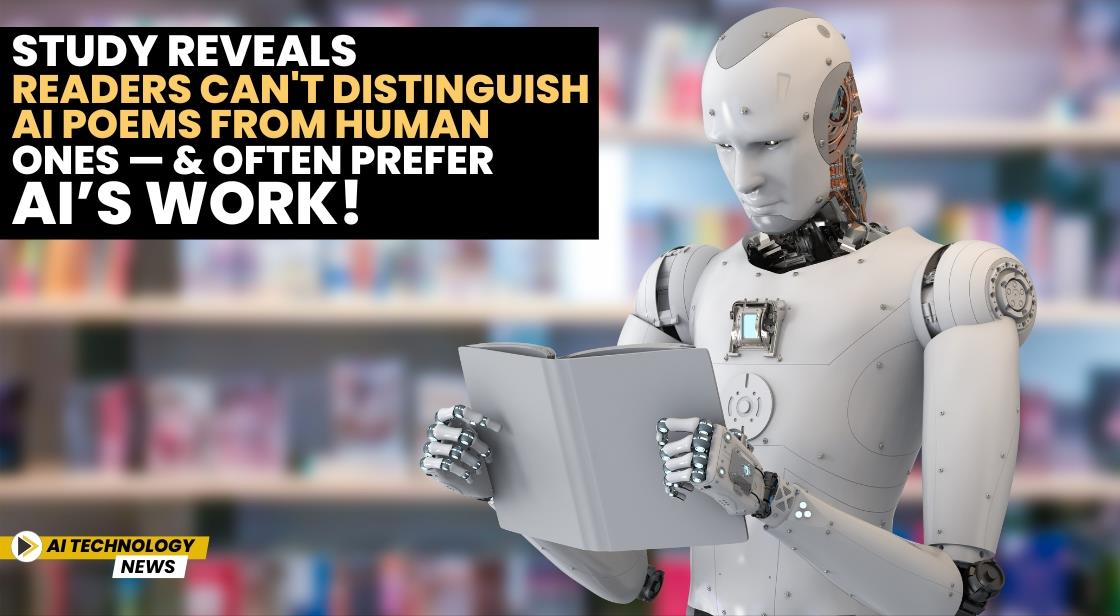Study Reveals Readers Can't Distinguish AI Poems from Human Ones — and Often Prefer AI’s Work!

News Synopsis
In a surprising discovery about human taste in poetry, a recent study has shown that most people struggle to tell whether a poem was created by artificial intelligence or a human writer. Even more astonishing, readers tend to prefer poems generated by AI! Researchers Brian Porter and Edouard Machery from the University of Pittsburgh set out to explore this phenomenon, revealing unexpected insights into how we perceive and evaluate poetry.
Can You Tell AI from Human Poetry?
For this groundbreaking experiment, Porter and Machery gathered a diverse group of over 1,600 participants, asking each to read a selection of ten poems. Half of the poems were written by renowned poets, including literary greats like William Shakespeare, Emily Dickinson, Lord Byron, and T.S. Eliot, while the remaining five were created by ChatGPT-3.5, specifically programmed to emulate these poets’ styles.
Without any hints as to each poem’s origin, participants were asked to evaluate the verses they read, leading to some surprising conclusions.
The results? Readers often believed that AI-created poems were penned by humans. Interestingly, the poems that participants least associated with human authorship were, in fact, written by these legendary poets, raising questions about how we define the qualities of “real” poetry.
Defining “Real” Poetry: What Makes a Poem Seem Human?
Intrigued by the findings, the researchers devised a second experiment involving 696 new participants to examine further. In this round, each participant evaluated poems based on qualities like beauty, emotional depth, rhythm, and originality. This time, readers were split into three groups: one group was informed that the poems were human-made, another was told they were AI-generated, and a final group received no background information.
As predicted, knowledge influenced perception. Readers who knew poems were AI-generated rated them lower on nearly all qualities. However, when participants were unaware of the source, they often rated AI-generated poems higher than those by human poets. The research illustrates an intriguing pattern — without preconceptions, people tended to favor the AI-generated poems.
Why Do We Often Prefer AI-Generated Poetry?
The study by AI! Researchers Brian Porter and Edouard Machery from the University of Pittsburgh sheds light on why AI poems can seem more appealing at first glance. Often, AI-generated verses are crafted to be straightforward and accessible, making their themes easy to grasp. In contrast, classic poetry is known for its complexity, which can sometimes lead readers to misinterpret its depth as confusion or obscurity. This simplicity in AI-generated poetry often wins favor, as it is designed to be accessible and instantly gratifying.
Ultimately, while we expect to prefer human poetry for its depth and authenticity, AI's ability to create smooth, easily appreciated poems can deceive us into thinking it's human work.
These findings, now published in Scientific Reports, provide new perspectives on AI's impact on the creative arts and how our perceptions shape our appreciation of art.
Conclusion
The study underscores how artificial intelligence is reshaping our perception of creative arts, even in domains like poetry, where human expression has traditionally reigned supreme. The findings reveal that while readers claim to value the complexity and authenticity of human-crafted poetry, their preferences often lean toward the accessibility and clarity of AI-generated works.
This juxtaposition highlights the evolving relationship between humans and AI in creative fields and raises important questions about how we define artistic value in an age of advanced technology. As AI continues to refine its creative capabilities, it challenges us to rethink the essence of art, creativity, and our emotional connections to them. Whether AI poetry complements or competes with human ingenuity, one thing is clear — it’s opening a new chapter in the history of artistic expression.
You May Like









